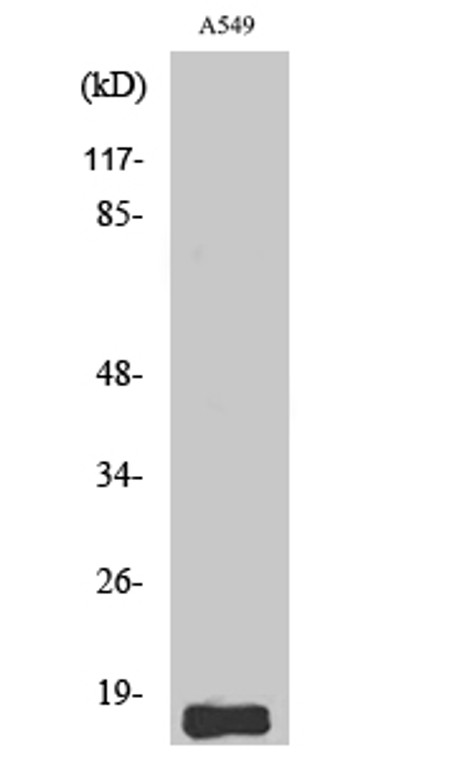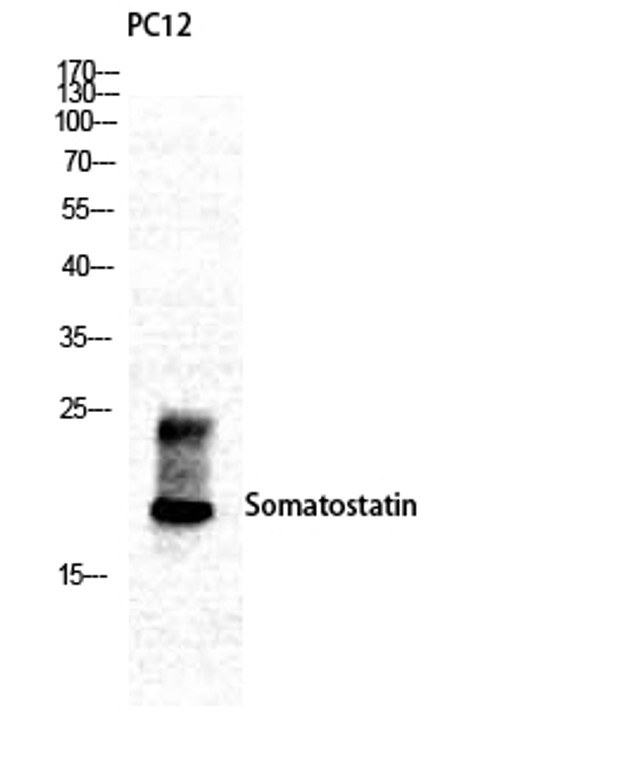| Host: |
Rabbit |
| Applications: |
WB/IHC/IF/ELISA |
| Reactivity: |
Human/Mouse/Rat |
| Note: |
STRICTLY FOR FURTHER SCIENTIFIC RESEARCH USE ONLY (RUO). MUST NOT TO BE USED IN DIAGNOSTIC OR THERAPEUTIC APPLICATIONS. |
| Short Description: |
Rabbit polyclonal antibody anti-Somatostatin (10-59 aa) is suitable for use in Western Blot, Immunohistochemistry, Immunofluorescence and ELISA research applications. |
| Clonality: |
Polyclonal |
| Conjugation: |
Unconjugated |
| Isotype: |
IgG |
| Formulation: |
Liquid in PBS containing 50% Glycerol, 0.5% BSA and 0.02% Sodium Azide. |
| Purification: |
The antibody was affinity-purified from rabbit antiserum by affinity-chromatography using epitope-specific immunogen. |
| Concentration: |
1 mg/mL |
| Dilution Range: |
WB 1:500-1:2000IHC 1:100-1:300ELISA 1:5000IF 1:50-200 |
| Storage Instruction: |
Store at-20°C for up to 1 year from the date of receipt, and avoid repeat freeze-thaw cycles. |
| Gene Symbol: |
SST |
| Gene ID: |
6750 |
| Uniprot ID: |
SMS_HUMAN |
| Immunogen Region: |
10-59 aa |
| Specificity: |
Somatostatin Polyclonal Antibody detects endogenous levels of Somatostatin protein. |
| Immunogen: |
The antiserum was produced against synthesized peptide derived from the human Somatostatin at the amino acid range 10-59 |
| Function | Somatostatin-14: Inhibits the secretion of pituitary hormones, including that of growth hormone/somatotropin (GH1), PRL, ACTH, luteinizing hormone (LH) and TSH. Also impairs ghrelin- and GnRH-stimulated secretion of GH1 and LH.the inhibition of ghrelin-stimulated secretion of GH1 can be further increased by neuronostatin. Neuronostatin: May enhance low-glucose-induced glucagon release by pancreatic alpha cells. This effect may be mediated by binding to GPR107 and PKA activation. May regulate cardiac contractile function. May compromise cardiomyocyte viability. In the central nervous system, may impair memory retention and may affect hippocampal excitability. May also have anxiolytic and anorexigenic effects. May play a role in arterial pressure regulation. May inhibit basal, but not ghrelin- or GnRH-stimulated secretion of GH1 or LH, but does not affect the release of other pituitary hormones, including PRL, ACTH, FSH or TSH. Potentiates inhibitory action of somatostatin on ghrelin-stimulated secretion of GH1, but not that on GnRH-stimulated secretion of LH. |
| Protein Name | SomatostatinGrowth Hormone Release-Inhibiting Factor Cleaved Into - Somatostatin-28 - Somatostatin-14Sst-14 - NeuronostatinNst |
| Database Links | Reactome: R-HSA-375276Reactome: R-HSA-418594Reactome: R-HSA-9022702 |
| Cellular Localisation | Secreted |
| Alternative Antibody Names | Anti-Somatostatin antibodyAnti-Growth Hormone Release-Inhibiting Factor Cleaved Into - Somatostatin-28 - Somatostatin-14 antibodyAnti-Sst-14 - Neuronostatin antibodyAnti-Nst antibodyAnti-SST antibody |
Information sourced from Uniprot.org
12 months for antibodies. 6 months for ELISA Kits. Please see website T&Cs for further guidance















